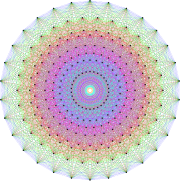| Lie groups and Lie algebras |
|---|
 |
In mathematics, the complexification or universal complexification of a real Lie group is given by a continuous homomorphism of the group into a complex Lie group with the universal property that every continuous homomorphism of the original group into another complex Lie group extends compatibly to a complex analytic homomorphism between the complex Lie groups. The complexification, which always exists, is unique up to unique isomorphism. Its Lie algebra is a quotient of the complexification of the Lie algebra of the original group. They are isomorphic if the original group has a quotient by a discrete normal subgroup which is linear.
For compact Lie groups, the complexification, sometimes called the Chevalley complexification after Claude Chevalley, can be defined as the group of complex characters of the Hopf algebra of representative functions, i.e. the matrix coefficients of finite-dimensional representations of the group. In any finite-dimensional faithful unitary representation of the compact group it can be realized concretely as a closed subgroup of the complex general linear group. It consists of operators with polar decomposition g = u • exp iX, where u is a unitary operator in the compact group and X is a skew-adjoint operator in its Lie algebra. In this case the complexification is a complex algebraic group and its Lie algebra is the complexification of the Lie algebra of the compact Lie group.
